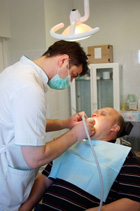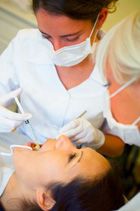 Nobody wants to lose teeth, either due to decay or because of an accident, but the likelihood of losing at least one tooth is something that nearly half of us will face at some stage in our lives. Missing teeth can look unpleasant and particularly in younger patients cause a loss of confidence and self esteem. There are also several very important medical reasons why it is important to replace missing teeth.
Nobody wants to lose teeth, either due to decay or because of an accident, but the likelihood of losing at least one tooth is something that nearly half of us will face at some stage in our lives. Missing teeth can look unpleasant and particularly in younger patients cause a loss of confidence and self esteem. There are also several very important medical reasons why it is important to replace missing teeth.
Missing teeth can cause teeth to move in the dental arc, interrupting bite and causing painful jaw conditions. It is also very bad for the other teeth as they are exposed to more plaque and bacteria. More and more teeth are now being artificially replaced with a procedure called a dental implant. Implants are small titanium screws fixed directly into the jawbone to act as a solid base for an artificial tooth.
Dental implants have several key advantages over other forms of dental restoration. Firstly, because they replace the root of the tooth as well as the crown they are much more stable than dental bridges or partial dentures. This means that patients are able to eat whatever foods they want without the anxiety of breaking any part of the restoration.
Implants also look and feel a lot more realistic as they replace more of the original tooth preventing further bone loss and gum recession. A well-fitted dental implant will also last a lifetime compared tot the ten to fifteen year average of a bridge or denture. For these reasons and many others, dental implants are the number one choice of dental restoration at City of Leeds dentists.





 There are over 350 types of bacteria found in the average human mouth but many of these have no real harmful effects. However, about 5 per cent of these bacteria are responsible for causing gum disease if not removed by brushing and flossing.
There are over 350 types of bacteria found in the average human mouth but many of these have no real harmful effects. However, about 5 per cent of these bacteria are responsible for causing gum disease if not removed by brushing and flossing. There are few if any dental problems that cannot be treated successfully if diagnosed early enough. Ideally, any pain or discomfort experienced in the mouth should be seen by a dentist as soon as possible. With dental care it is prevention that is much more effective than cure. This is why dentists stress the importance of six-monthly check ups.
There are few if any dental problems that cannot be treated successfully if diagnosed early enough. Ideally, any pain or discomfort experienced in the mouth should be seen by a dentist as soon as possible. With dental care it is prevention that is much more effective than cure. This is why dentists stress the importance of six-monthly check ups. The links of diabetes with heart disease, stroke and kidney failure are well known but perhaps lesser known is the link between diabetes and periodontal disease. Sufferers of diabetes have difficulty controlling their blood sugar level which greatly increases the chance of them developing serious gum disease.
The links of diabetes with heart disease, stroke and kidney failure are well known but perhaps lesser known is the link between diabetes and periodontal disease. Sufferers of diabetes have difficulty controlling their blood sugar level which greatly increases the chance of them developing serious gum disease. A relatively new weapon in the war against dental disease is the dental hygienist. More and more dental practises across the country are using hygienists to supplement the treatment offered by the dentist, to provide the most comprehensive dental care possible.
A relatively new weapon in the war against dental disease is the dental hygienist. More and more dental practises across the country are using hygienists to supplement the treatment offered by the dentist, to provide the most comprehensive dental care possible. Teeth whitening has become an industry in itself, there are so many ways you can achieve the perfect look, that it is almost frightening. From artificial veneers, to pastes that that go in a mould and even a special light that whitens the teeth, its all there and on the High Street. Katie Price aka Jordan was in the Jungle recently and remarked that she couldn’t chew something because her teeth weren’t her own. What Katie meant was that the recent treatment she had had, meant she had to be restrictive on what she ate. It all sounds quite expensive, but surprisingly enough it isn’t, which is good news for those of us that have changed our lifestyles and become non-smoking and non-wine drinking. Giving up the habits that ruin our teeth is one thing, but is so encouraging when as a reward we can go and have our stained teeth brought back to their former glory. One of the most prolific times we need white teeth is at a wedding, especially our own wedding. In City of Leeds a company offers a service specifically aimed at the wedding market, whitening is amongst the many services they offer to brides and grooms. A housewife in America claims to have come up with a cheap way of whitening teeth using simple household liquids, many of which we use every day and are considered harmless, but for me I’ll stick to the dentists that are registered and qualified to do this work, this is a subject that you shouldn’t take risks with and doing it on the cheap, so to speak, isn’t the answer.
Teeth whitening has become an industry in itself, there are so many ways you can achieve the perfect look, that it is almost frightening. From artificial veneers, to pastes that that go in a mould and even a special light that whitens the teeth, its all there and on the High Street. Katie Price aka Jordan was in the Jungle recently and remarked that she couldn’t chew something because her teeth weren’t her own. What Katie meant was that the recent treatment she had had, meant she had to be restrictive on what she ate. It all sounds quite expensive, but surprisingly enough it isn’t, which is good news for those of us that have changed our lifestyles and become non-smoking and non-wine drinking. Giving up the habits that ruin our teeth is one thing, but is so encouraging when as a reward we can go and have our stained teeth brought back to their former glory. One of the most prolific times we need white teeth is at a wedding, especially our own wedding. In City of Leeds a company offers a service specifically aimed at the wedding market, whitening is amongst the many services they offer to brides and grooms. A housewife in America claims to have come up with a cheap way of whitening teeth using simple household liquids, many of which we use every day and are considered harmless, but for me I’ll stick to the dentists that are registered and qualified to do this work, this is a subject that you shouldn’t take risks with and doing it on the cheap, so to speak, isn’t the answer. What is a dental implant and how can I benefit from one? That is a question that a dentist in Leeds is asked a lot. He explains it as an artificial tooth that has all the qualities of a natural one, but with some vast improvements that are unique to the patient. The sort of teeth he usually replaces with implants are either damaged beyond repair, discoloured or misshapen teeth. It is ideal for a patient who requires an individual or a few separate teeth replaced. The procedure is quite simple too; first X-rays are taken to ascertain the strength of the jaw bone below or above the rogue tooth. Then a tooth is made to fit perfectly into the gap left by the removal of the damaged tooth. A drilled hole is made in the jaw and a base is placed in the hole. This has a pre-prepared screwed insert running up the centre, into this is screwed and glued the new tooth, how easy is that? It not only provides the patient with better eating habits, it has a tendency to also give them back some confidence they might have lost through the rogue tooth. An improved and confident smile is one of the first benefits; it also alleviates the need to replace a whole row of teeth for the sake of a few bad ones. False teeth are O.K. in most cases and patients adapt to them really well, but implants are the definitive answer in a lot of cases that in the past would have resulted in more expensive, and long term treatment. Chewing has also been reported by patients to have been drastically improved in many cases, and that in itself is a healthy improvement against decay and gum disease.
What is a dental implant and how can I benefit from one? That is a question that a dentist in Leeds is asked a lot. He explains it as an artificial tooth that has all the qualities of a natural one, but with some vast improvements that are unique to the patient. The sort of teeth he usually replaces with implants are either damaged beyond repair, discoloured or misshapen teeth. It is ideal for a patient who requires an individual or a few separate teeth replaced. The procedure is quite simple too; first X-rays are taken to ascertain the strength of the jaw bone below or above the rogue tooth. Then a tooth is made to fit perfectly into the gap left by the removal of the damaged tooth. A drilled hole is made in the jaw and a base is placed in the hole. This has a pre-prepared screwed insert running up the centre, into this is screwed and glued the new tooth, how easy is that? It not only provides the patient with better eating habits, it has a tendency to also give them back some confidence they might have lost through the rogue tooth. An improved and confident smile is one of the first benefits; it also alleviates the need to replace a whole row of teeth for the sake of a few bad ones. False teeth are O.K. in most cases and patients adapt to them really well, but implants are the definitive answer in a lot of cases that in the past would have resulted in more expensive, and long term treatment. Chewing has also been reported by patients to have been drastically improved in many cases, and that in itself is a healthy improvement against decay and gum disease. It sounds like the fast train to the city of Leeds, but it is actually a quite unique and unobtrusive way of re-aligning your teeth. When we think of this, we tend to conjure up an image of medieval torture that has been adapted by dentists to straighten out molars. With Invisalign the past is banished to the past, and the latest technology takes over. Using computer generated images (CGI) an orthodontist works with the client to create an image, usually in 3D, of how the client’s teeth would look like if they were properly and naturally aligned. Taking X-rays and feeding them into a computer, along with technical details of the client’s teeth, the image is generated quite quickly and the client can see how their teeth will eventually look like. This is using technology at its best; it’s quite awesome to see the CGI of your face with your dream teeth in place. Once that process is completed, the technicians go to work to create a transparent guide for the teeth, there’s no obtrusive wire, braces or soldering and it’s a lot more comfortable. The cost is more that the conventional methods, but you only get what you pay for these days. Dentistry is no different to any other form of medical care; in fact it’s true to say that how our smile appears has an impact on our mental being, and how we feel about ourselves. It is a specialist form of teeth alignment and repair, so make sure you use a reputable firm that is qualified, registered and most importantly recommended.
It sounds like the fast train to the city of Leeds, but it is actually a quite unique and unobtrusive way of re-aligning your teeth. When we think of this, we tend to conjure up an image of medieval torture that has been adapted by dentists to straighten out molars. With Invisalign the past is banished to the past, and the latest technology takes over. Using computer generated images (CGI) an orthodontist works with the client to create an image, usually in 3D, of how the client’s teeth would look like if they were properly and naturally aligned. Taking X-rays and feeding them into a computer, along with technical details of the client’s teeth, the image is generated quite quickly and the client can see how their teeth will eventually look like. This is using technology at its best; it’s quite awesome to see the CGI of your face with your dream teeth in place. Once that process is completed, the technicians go to work to create a transparent guide for the teeth, there’s no obtrusive wire, braces or soldering and it’s a lot more comfortable. The cost is more that the conventional methods, but you only get what you pay for these days. Dentistry is no different to any other form of medical care; in fact it’s true to say that how our smile appears has an impact on our mental being, and how we feel about ourselves. It is a specialist form of teeth alignment and repair, so make sure you use a reputable firm that is qualified, registered and most importantly recommended. A dental emergency, like any medical emergency can have potentially serious long-term consequences if not treated correctly and quickly. By ignoring or avoiding treatment you could put yourself at risk of much more extensive and costly treatment in the future.
A dental emergency, like any medical emergency can have potentially serious long-term consequences if not treated correctly and quickly. By ignoring or avoiding treatment you could put yourself at risk of much more extensive and costly treatment in the future. In the past, patients and dentists have been slightly reluctant to use dental crowns unless absolutely necessary. This is because the old laboratory made crowns could often be bulky and require significant enamel removal to allow them to fit naturally over the top of the tooth. Removing otherwise healthy enamel is never ideal so dentists would often opt to use other treatments such as fillings and dental bonding.
In the past, patients and dentists have been slightly reluctant to use dental crowns unless absolutely necessary. This is because the old laboratory made crowns could often be bulky and require significant enamel removal to allow them to fit naturally over the top of the tooth. Removing otherwise healthy enamel is never ideal so dentists would often opt to use other treatments such as fillings and dental bonding.

